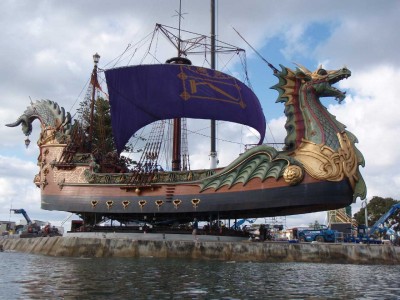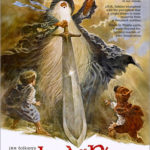‘Dawn Treader’ Film May Hit Story Sandbars, Part 1
 First Disney dropped distributing the Chronicles of Narnia film franchise. Then Fox picked it up.
First Disney dropped distributing the Chronicles of Narnia film franchise. Then Fox picked it up.
Then it seemed that producer Walden Media’s new director, Michael Apted, might bring a better story adaptation. But a leaked script emerged that included some rather gross perversions of C.S. Lewis’s original story. Yet the producers said that was not the film’s current script.
More recently have come the film trailers that contain even more divergent content. You can view the most recent trailer linked in last Friday’s column, or this trailer, to see what I mean.
Last weekend I returned to the NarniaWeb podcast, hosted by “Rilian” and in this episode costarring “GlumPuddle” (who has a hilarious video rundown of the recent trailer), “Warrior 4 Jesus” and me. Apparently the final mix isn’t yet finished [edit: now it is; download it here], but in that podcast many of us expressed worry about the film — not primarily because it has clearly changed some of the story, or at least added a kind of “flashback” to the White Witch (again). Rather, we were concerned that the book’s central themes will be overridden by modern-focused fantasy shtick.
It would be great to get a disclaimer, but that same notion seems reflected in a quote last week from director Apted himself (which is repeated, with source, in that same Friday column).
Below I’ll quote myself (with some edits) about Apted and the film’s adaptation, not because I think I said it best, but because so far my voice track is the only one I have from the recording.
The problem is something that you identified earlier, Rilian. You called it a “philosophical difference,” that the quote really kind of cuts to a philosophical difference between the book, and perhaps what’s sounding like (without qualification) the movie adaptation.
I want to be really cautious, and I don’t want this to sound mean when I use C.S. Lewis’s phrase chronological snobbery. There was a little of that in the last film [Prince Caspian], and even a little bit less in The Lion, the Witch and the Wardrobe; it wasn’t too bad. But it’s a very subtle attitude that goes like, “Hey, we’re too cool for this stuff. We need to put in some modern stuff. You know, we’re in on the joke. This is just a nice little story. But we need to make it more like Star Wars or Harry Potter.”
That’s kind of the giveaway there. And while I like Star Wars, and I like Harry Potter even more — that’s Star Wars, and that’s Harry Potter. Let them be them, and let Narnia be Narnia.
Why can’t we just tell the story? Maybe punched up a little bit — I don’t mind some filling out the details. They did some of that in The Lion, the Witch and the Wardrobe. I don’t mind changing the order of the islands around. Heck, I could even get used to the Seven Swords, maybe Star Girl if I was really relaxed. But to revise things to this extent — at the very least, I’d like to hear a qualification going [for Apted’s quote]: “Here’s what I meant by that. Here’s what I did not mean. And we are going to try to meet the themes of the book. We’re not just trying to be another Star Wars, and we’re not trying to be Harry Potter, where all these details mesh together, we have all these little subplots where everything’s got to connect, and we have to imitate the other guy.”
Another term for [the main story] that’s used in novels and such is metanarrative. You need to understand your metanarrative. You can play with the subplots a little bit, but there’s at least three main metanarratives in The Voyage of the Dawn Treader that have to be adhered to, or else it’s not The Voyage of the Dawn Treader.
[They must get] those three right, and make them the main thing. You can’t just kind of give a polite nod and a salute in that direction, then go off on a quest for seven swords.
Please, I don’t mind the seven swords, Mr. Apted (I know you’re listening) but make sure to keep the main thing the main thing. [Otherwise] it’s like opening the Bible and getting all lost about trying to figure out who the Nephilim are, from Genesis 6, instead of, oh yeah, there’s this whole Flood there. Let’s keep the main story the main story.
Recently I was reading a article in a Christian magazine [Narnia Invaded by Stephen J. Boyer, TouchStoneMag.com, 2010] about how Prince Caspian in particular, while they had to change the story, they had made all kinds of alterations and had completely failed to understand Lewis’s approach toward authority, the kingly role in Narnia, and how that changes you, and how authority doesn’t make you into a bully that wants to go start fights in a subway station. It makes you more noble than that. And I understand how they wanted to change that. But I just haven’t seen a whole lot that is different from that previous approach. And this quote seems to undergird that. It’s like “we’ve got to change that, we’ve got to update it, we’ve got to fill in the gaps,” and even more than filling in the gaps, “we’ve got to find a new big story that ties it all together.”
But for Voyage of the Dawn Treader, you already have three big stories. To me, they’re:
- Reepicheep’s quest, which is closely allied with,
- Finding Aslan’s Country — that’s perhaps the biggest one — which of course is closely allied with,
- Eustace’s transformation.
If they get those three right — and I haven’t seen anything that contradicts that at least Eustace will have a good “un-dragoning” (a March 2 Christianity Today article) — if they get those three things right, I don’t even mind them rehashing the White Witch. But they have to get those three elements right. That will make a good film, and that will make a film that honors The Voyage of the Dawn Treader book.
Next week: an overview of my original hopes and expectations for the film, listed in part 1 and part 2 of my column last year, and whether the current film may meet them.











































Excellent thoughts, Stephen. Though I tend to be more strongly purist in my intolerance for any changes, I think there truly is a distinction between changes that fill in gaps and changes that override the story’s original message. I hate both but the latter is far more insidious. And I admit I just don’t understand fans who like and defend such changes.
To give an example of changes I don’t mind: In Jackson’s Fellowship of the Ring, he completely skips the story of Tom Bombadil and instead has Strider give the Hobbits their swords. Likewise, he also has Arwen take Frodo to Rivendell instead of an Elf we never build any emotional connection to and never hear from again. These changes might offend complete purists, but let’s get real: Bombadil is a neat story, but doesn’t work even in an extended version of a movie, and it makes better narrative sense for Arwen to be introduced as part of the story rather than expect movie audiences to read the appendix of a book. Also, while I love the Scouring of the Shire in Return of the King, it made sense not to include it in a movie that was already completely full (and at least in the extended edition, we got the fall of Saruman in a close to canon version).
But then there are the other changes. For example, while I don’t mind having explanations for Arwen (else how will the audience understand the ending?), I despised that this focus shortchanged Lothlorien and Galadriel. Although there was more in the extended version, I objected to the fact that the gifts were not given prime focus not because it’s my favorite part of the story, but because these gifts later become very important plot points (Sam’s rope, Frodo’s phial of light, the elven cloaks, even the lembas). Because these weren’t explained in Fellowship, there were quick chunky pieces of dialogue required in Two Towers to explain them (and even then, I’m not sure many people understood why the cloaks allowed them to hide). Then there’s Strider’s strange near-death experience, the weird relunctance by Théoden to aid Gondor, and worst of the worst: Faramir. Oh, poor misunderstood Faramir: a friend of mind suggested he sue for character defamation due to his portrayal in Two Towers. I’d be willing to represent him.
I, er, strenuously disagree that it was all right for them to cut the Scouring of the Shire because the movie was already full. In my opinion the Scouring of the Shire is, at least from a theoretical view of the plot (identifying the main problem by what’s introduced that way, not by what takes up most of the three volumes) and for at least one of the major themes, arguably the most important section of the whole story. Cutting it severely damages the story. I would be more sympathetic to the argument that there wasn’t time for it if the filmmakers hadn’t added so many sequences made up out of whole cloth (elves at Helm’s Deep? Frodo and Sam in Gondor with the Nazgul overhead? Saruman’s warg riders attacking the Rohirrim refugees, and that whole “near-death experience” thing with Aragorn and his horse? Denethor’s leap off the White Tower? We could go on …) and devoted so much screen time on battle “action.” (To quote the podcast linked above, “Less is more.”)
On the other hand, I agree that Bombadil was a natural sequence to cut (though that *should* have been filmed and either added to the extended edition or released as a separate short film), that replacing Glorfindel with Arwen was a good decision (though we do *so* hear from Glorfindel again; he is a notable participant in the Council of Elrond and then turns up with the rest of Elrond’s household escorting Arwen to her wedding), and that the movie’s treatment of Faramir was utterly wrong. And I hadn’t even thought about their handling of the gifts, or the change in Theoden’s behavior toward Gondor.
It’s been a while since I last read the trilogy, so I couldn’t remember whether Glorfindel (ah, that was his name!) showed back up. Even so, I think we agree that he’s not so important a character that the switch makes more sense from a virgin audience perspective (and it is the director’s duty to be the audience’s advocate).
As for the Scouring, I agree that in the books, it is important for the character and narrative archs of the Hobbits, especially Merry and Pippin. The thing I’ve always loved about this part is that they go from being the tag-a-long bumblers in Fellowship to being the military leaders at the end of Return, to the point that Frodo has to pull them back from doing too much damage. The Hobbits have now grown to their full potential, and taken their place in the greater world. The problem with saying this was required in the movies is that Merry and Pippin aren’t given much introduction in Fellowship. Remember, we didn’t have the trip to Merry’s house (and the lovely bathtub song) or time with Farmer Jones. Instead, Merry and Pippin run into Frodo and Sam, escape a Nazgul, and hurriedly make for Bree. So their personal narratives are never set up: tying them up later doesn’t make as much sense.
I agree that if Jackson hadn’t gone crazy during Towers (and you mention many of my peeves with that strange movie) there’d have been more time in Return for such things. But the fact is he did, it was done, and he still managed to pull off a tremendous soaring work in the final film. And frankly, even in extended editions of films, it’s impossible to stuff everything from such full stories. The Scouring was a logical cut, and allowed Jackson to focus on what he cared about more: Frodo’s narrative and leaving the Shire. Director’s prerogative. The only way we’ll get all of the minor plot threads of LOTR is if someone decides to do a long epic miniseries on the small screen.
I hadn’t even thought of the Scouring’s importance in Merry and Pippin’s story. In my opinion the *main plot* is Frodo’s quest to protect the Shire’s innocence. This is part of why he takes the Ring and leaves the Shire in the first place. the Scouring of the Shire is Frodo’s coming home from a great victory to find out that he has failed. This is another instance (to paraphrase the podcast again) of the principle that a great book is one that breaks the rules and makes it work. I’d forgotten that so much of the other end of the narrative arc, that set up for this, had been cut, which makes me feel somewhat better about it–now the movie does work _per se_, and the Scouring is indeed a logical cut given the first film as it is, but this is rather as if instead of adding the “seven swords” plot to _Dawn Treader_ the film cut both Reepicheep’s quest and any attempt to find Aslan’s country, and had the Dawn Treader just turn around after the Last Island, making the finding of the seven lords the *only* main plot thread. I understand and agree that you have to cut something, but you don’t cut *the main plot*.
You mention “director’s prerogative”; in my review of _Prnce Caspian_ a few years ago, which stepped aside into a rant about the _Lord of the Rings_ movies for a while, I quoted Lois McMaster Bujold on how it is the *author’s* prerogative “to have a Better Idea.” And that’s what Jackson and all the Narnia filmmakers seem to have thought they were doing, except that because Tolkien is Tolkien and Lewis is Lewis the filmmakers’ “Better Ideas” are far inferior to the originals.
I think you pinpointed my Peter issue with Caspian (really, that was my only issue) nicely: Caspian is about kingship, and Peter wasn’t kingly – despite him supposedly being something of an ideal in the book.
What I really think is odd is that the trailers haven’t said much about what their quest is. And I’m admittedly not horribly sold on the return of the White Witch (it worked, surprisingly, in PC) – but hey. I’m still holding out that they’ve deliberately withheld things from everyone.
Oh, poor misunderstood Faramir: a friend of mind suggested he sue for character defamation due to his portrayal in Two Towers. I’d be willing to represent him.
Ha!
Yeah, I only had a few major gripes with LOTR: Destroying Faramir, making Aragorn a ‘reluctant hero,’ and randomly tying Arwen to the ring. A smaller one: Since there was no Scouring, ROTK really could, and probably should, have ended with Aragorn’s coronation. Their going home after is simply assumed. I do understand people’s complaints on the ending, because if you haven’t read the book, you don’t realize that the movie is trying to cover the aftermath without getting into the Scouring.
But hey.
And you are right on the gifts: They come off a little god of the machine if you don’t realize their significance. Course, the only reason Merry killed the Witch King was because the blades they found in the Barrow-Downs were special. *shrug*
I could take some changes, but this is too extreme. I am against this movie, and I am strongly thinking of dropping it. The reason is that I can understand changing some ideas in an adaptation. However, there is a bare minimum that you have to have to actually say that something is truly “adapted” from, or “based on” a book. Granted, I am very much a purist myself, so that governs some of my dislike. For instance, I disliked the Keira Knightley adaptation of *Pride and Prejudice* because they stayed too much from the book, (including making it all Elizabeth’s fault and making Bingley an idiot), but I digress.
Short point, I want the movie more closely to resemble the book, and will not accept the current ideas. Nevertheless, this one does not deserve the title, because it is mostly unrelated to the book.
Ah, careful, you are mentioning one of my all time movie complaints: Pride and Prejudice, of which even the ever faithful A&E version doesn’t get Darcy right. Oh, the horror of watching this character be so painfully mistreated by director after director. I sometimes wonder if these people read the same book as me, or realize that Austin despised overwrought angst and was more about playful irony.
In an example of positive changes: as anyone seen the new Sherlock from the BBC? It’s an updated version of the Sherlock Holmes stories set in modern-day London, and it totally rocks. In a sense, the decision to lift Holmes out of foggy Victorian London has allowed the writers (who are self-admitted fans of Doyle from a young age) to be truer to the character, and both he and Watson are completely spot on character-wise. You can catch the three episodes of season 1 over at PBS’s website.
So heartily agreed on Sherlock. The essence is there; only the trappings have changed. And it’s wonderful in many ways because of the modernization, rather than in spite of it — at the time Doyle was writing, Sherlock was on the cutting edge of forensic technology and investigative deduction, and moving him into the 21st century and arming him with a cell phone really enhances that instead of leaving him in the realm of the “Oh, how quaint and historical,” where he had languished for so many years. And Holmes was always an arrogant, abrasive character, so he doesn’t really change at all in that respect.
But the attempts at modernizing Lewis and Tolkien have largely fallen into the trap of making all their heroes post-modern — nobody can actually be noble or dignified or heroic, they all have to be riddled with insecurities and ambivalence. So Aragorn can’t actually be ready to be king, he has to doubt whether he really wants to be king. Faramir can’t resist the spell of the Ring, he has to fall prey to it. Peter can’t graciously accept and even help support Caspian as the new king of Narnia, he has to whine about it and keep playing this game of one-upmanship. But instead of making all these characters more sympathetic and “human” as the filmmakers appear to have intended, it only has the effect of making them all look like jerks.
I really hope DAWN TREADER doesn’t inflict a lot of Jerkish Edmund Behavior on us. We’ve got enough of that with Eustace in the original already, and it’s much more enjoyably and cleverly handled.
Speaking of movies that are nothing like the books, can we say “Bourne”, anyone?
[…] latest trailers for the upcoming film adaptation of The Voyage of the Dawn Treader (I tip my hat to E. Stephen Burnett and GlumPuddle), it looks to have reversed that […]
[…] Last week I shared some uncertainties about Walden Media’s coming third Chronicles of Narnia film, which is based on the third book in C.S. Lewis’s classic series. Fox is distributing the film, which will release Friday, Dec. 10 in the U.S., and last month director Michael Apted seemed to be saying that much of the film is based on material Lewis did not actually write. […]
A wonderful post, Stephen. I couldn’t agree with you more (and I DID listen to this podcast, I’m a great fan of Narniaweb and especially Rillian’s corner of the site). Thanks for putting things so eloquently.
I’ll look forward to those future posts.
Christian — Rilian and I have been long-range friends for a while and I’ve enjoyed being on the podcast several times. Interesting how small the world is, especially when the internet factors in! Thanks for your encouragement. The second column is now up for today; the third and final in this miniseries will come next Thursday.
[…] the Dawn Treader, has helped me a lot. In this miniseries’ last installment, and even more so in part 1, I was more pessimistic, concerned the film had sacrificed themes of seeking Aslan’s Country for […]